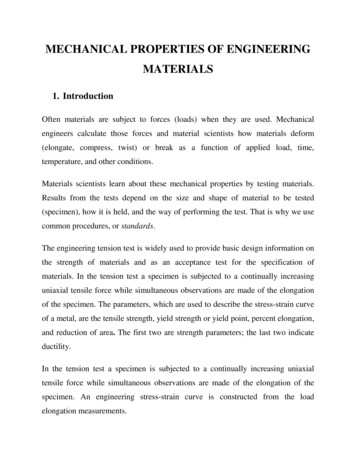E L N E C Pediatric Palliative Care - THAICHILDHEALTH
E L N E CPediatric Palliative CareEnd-of-Life Nursing Education ConsortiumModule 4:Ethical/Legal Issues inPediatric Palliative CareELNECPediatric Palliative Care
Responding to Ethical Issues Advances in medical technologyChildren as a vulnerable groupLack full maturity and legal authority to makedecisionsSocial changesIncreased fear of litigationMedical futility conceptLack of caregiversReimbursement for pediatric palliative careLack of knowledge of pediatric palliative care optionsUncertainty of prognosis in pediatric disease ELEthical issues are inevitableNECPediatric Palliative Care
Responding to Ethical Issues EL"Fight the good fight"Influence of values, culture,religionQuestions of meaningConflicts prevented bycommunication and shareddecision-makingNECPediatric Palliative Care
Nurses Role in AddressingEthical Issues ELPromoting family-centered careRespecting preferencesBeing knowledgeable about the ethical and legaldimensions of professional practiceRole models of clinical proficiency, integrity andcompassionBalancing competing objectivesLearning principles of pediatric palliative careWorking as a member of an interdisciplinary teamNECPediatric Palliative Care
Standards of ProfessionalNursing PracticeE ANA Code of Ethics Nurse Practice Act Standards for professionalorganizationsLNECPediatric Palliative Care
Issues of Decision-Making andCommunicationCapacity Ability to comprehend information,contemplate options, evaluate risks andconsequences, communicate decisionsConsent Legal term meaning willing acceptanceof an intervention after full descriptionof the interventionELNECPediatric Palliative Care
A Mother's TouchELNECPediatric Palliative Care
Issues of Decision-Making andCommunication (cont.) AssentIncorporates opinions of the child indecision-makingRequires team to disclose the planof care prior to decision-makingTreatment still depends on parent orguardian ConfidentialityHockenberry et al., 2003ELNECPediatric Palliative Care
Issues of Decision-Making andCommunication (cont.) DisclosurePrevious belief in not discussing diagnosiswith child Children have a right to be offereddevelopmentally appropriate informationabout their treatment optionsExplore parent reasons for not disclosingThe CHILD’S right not to know Right to decline information or to not knowBluebond-Langer, 1978ELNECPediatric Palliative Care
Ethical Issues in Palliative Care Prolongation of lifeCurative intentAcute therapeutic care Treating pneumonia in a dying childLife sustaining treatments Relief of symptomsProlonging sufferingJonsen et al., 2002;Stanley & Zoloth-Dorfman, 2006ELNECPediatric Palliative Care
Ethical Issues in Palliative Care(cont’d) Withholding/withdrawing of medical interventionsBurden outweighs benefitProlonging sufferingChild/family choicePoor quality of life Situations for withholding/withdrawingDeath by Brain criteriaIrreversible fatal conditionNo effective treatment availableNeonates ELNELethal abnormalitiesCPediatric Palliative Care
Ethical Issues in Palliative Care(cont.) ELDo Not Attempt ResuscitationRequires written order by MDFamily can change mind at any timeMedical FutilityConflicts regarding belief of the beneficialnature of a treatmentAsking the question – “For whom are wedoing this?” can avoid conflict situationsInstitutional policies regarding futilityNECPediatric Palliative Care
Ethical Issues in Palliative Care(cont.) Assisted suicideAdult issue EuthanasiaMore relevant to children thanassisted suicideIllegal in US ANA, 1994; Field & Cassel, 1997;Foley, 1995; Sulmasy, 1998ELNECPediatric Palliative Care
Principle of Double Effect An ethically permissible effectcan be allowed, even if theethically undesirable one willinevitably follow.Jonsen et al., 2002ELNECPediatric Palliative Care
Issues of Justice in PalliativeCare Provision of quality palliative careInequity in care delivery 56% of child deaths in hospital (US)Obstacles to accessLack of knowledge regarding pediatric palliative careResponsibility to provide bereavement Costs of palliative careCost effective optionQuality palliative care is a right for all people but thereare reimbursement issuesELNECPediatric Palliative Care
Research In Pediatric Care Is research appropriate?National Commission for Protection of SubjectsSound reasons for why research must be done withchildrenStudies should be done in adults before children, iffeasibleLevel of risk to the child must be carefully assessedResearch involving more than minimal risk andoffering no personal benefit requires special reviewInformed consent of parents/guardians requiredELNECPediatric Palliative Care
Best FriendsELNECPediatric Palliative Care
Facilitating Ethical and LegalPracticeThe 4 Box ityof LifeContextualFeaturesCPediatric Palliative CareJonsen et al., 2002
Medical Indications Indications for and against theinterventionReflect the goals of careCommon ethical dilemmasMedical futilityWithholding/withdrawing interventionsDNARCare of dying patientDetermination of deathELNECPediatric Palliative Care
Patient Preferences Principle of respect for personsAutonomy – person with decisional capacity has the moraland legal right to determine what will be done with theirown personPrivacy – right to privacy and the nurse acts to safeguardthat rightVeracity – the duty to be truthful Assess child/family understandingUnderstanding of medical condition and prognosisPrior preferences of childWhat are child and family hoping for and what would behelpfulELNECPediatric Palliative Care
Patient Preferences Advance Care Planning ELProcess of decision-making andcommunicating about goals of future careNurses role in assessing wishes for careAbility to have ongoing conversationswith children and families regardingpreferences and wishes for careNever to early to begin discussionsNECPediatric Palliative Care
Patient Preferences Advance Care Planning (cont.)E Decreases chance of conflict An ongoing, dynamic process Cultural, ethnic and age relateddifferencesLNECPediatric Palliative Care
Patient Preferences Living WillsE A less formal way tocommunicate advance directives Rarely used in pediatricsLNECPediatric Palliative Care
Praying for a MiracleELNECPediatric Palliative Care
Patient Preferences –Advance Directives Written method for child andfamily to plan and communicatechoicesLess common in pediatricsParents initiate directives ELState statutes differNECPediatric Palliative Care
Patient Preferences - Authorityof Parents Children are deemed legally capable of consent atage 18 Challenge of determining relevance and weight ofparental and patient preferencesPreferences conflict with the recommendations of theprovidersDetermining how reasonable and relevant child’spreferences areELNECPediatric Palliative Care
Patient Preferences - Standardfor Parental Preferences Parents as moral and legalagentsParents evaluation of treatmentefficacy or futilityInstances of parent andphysician conflictEthics consultationELNECPediatric Palliative CareJonsen et al., 2002
Quality of Life (QOL) Evaluation of prior QOLExpected QOL with and without treatmentCommon ethical dilemmas addressingQOLNutrition and hydrationWithhold/withdraw life support interventionsEuthanasiaSuicidePrinciple of double effect Jonsen et al., 2002ELNECPediatric Palliative Care
Contextual Features Social, legal, economic and institutionalcircumstancesFamily or provider issues affecting treatment decisionsFinancial/economic factorsCultural/religious factorsProblems with allocation of resourcesHow does the law affect treatment decisions?Conflict of interest on part of providers or institution Common ethical dilemmasResearch/Justice and allocation of resources/Economic issues/Confidentiality Jonsen et al., 2002ELNECPediatric Palliative Care
Managing Disagreement Parent – Child conflictSome states with minor treatment statutesEmancipated minorAdolescent-parent conflict Parent – Parent conflictPrior history of conflict will exacerbate whenchild at end of lifeAssessment of conflict historyMediation plays big roleField & Behrman, 2003ELNECPediatric Palliative Care
Managing Disagreement (cont.) Parent – Physician conflictParental refusal of treatment Religious conviction never a defense for life savingmeasureCriminal offense to not provide medical treatment to achildWhen cure is unlikely or impossible, courts allow forparents to make decisionsParental insistence on treatment ELNEMedical futilityEthics consultationCPediatric Palliative CareField & Behrman, 2003
Answering the Unanswerable QuestionsELNECPediatric Palliative Care
Organizational Ethics & LegalPractices Organizational ethicsMechanisms to respond to pain andsymptom management, advance careplanning, treatment cessation, andresource allocationEthics committees and consultationEducationPolicy developmentCase consultationELNECPediatric Palliative Care
ConclusionE Nurses need to engage in aprocess of ethical discernment Application of principles ofethics can assist in finding bestsolutionsLNECPediatric Palliative Care
Conclusion (cont.)E An ethical process is a way toseek balance in decision-making Nurses, working with otherdisciplines, advocate for childrenand familiesLNECPediatric Palliative Care
Little SisterELNECPediatric Palliative Care
L N E C Pediatric Palliative Care Issues of Justice in Palliative Care Provision of quality palliative care Inequity in care delivery 56% of child deaths in hospital (US) Obstacles to access Lack of knowledge regarding pediatric palliative care Responsibility to provid
Alison Sutherland 579 Alison Sutherland 1030 Alison Will 1084 Alison Haskins 1376 Alison Butt 1695 Alison Haskins 1750 Alison Haskins 1909 Alison Marr 2216 Alison Leiper 2422 Alistair McLeod 1425 Allan Diack 1011 Allan Holliday 1602 Allan Maclachlan 2010 Allan Maclachlan 2064 Allan PRYOR 2161 Alys Crompton 1770 Amanda Warren 120 Amanda Jones 387 Amanda Slack 729 Amanda Slack 1552 Amanda .
Relying on pen and ink, which is the conventional medium used for archaeological illustration (Dillon, B. 1987), the artist was able to use semiotic principles to turn traditional scientific illustrations into allegories of the subjective experience (figure 4). Figure 4 Illustrations have been used to draw the viewers’ attention to the skill of making and the focal points of the fledgling .
Adopted by the Council of The American Society of Mechanical Engineers, 1914; latest edition 2019. The American Society of Mechanical Engineers Two Park Avenue, New York, NY 10016-5990
ASTM F 891 Cellular Core PVC DWV Pipe ASTM D 2665 PVC DWV Pipe & Fittings NSF Standard 14 Dimensional Standard Schedule 40 Iron Pipe Size (IPS) Cell Class 12454 PVC Solid Wall Pipe & Fittings 11432 PVC DWV Cellular Core Pipe Maximum Working Temperature 140 F Maximum Working Pressure 0 (zero) PSI PVC DWV is NOT a pressure-rated piping system .
Materials scientists learn about these mechanical properties by testing materials. Results from the tests depend on the size and shape of material to be tested (specimen), how it is held, and the way of performing the test. That is why we use common procedures, or standards. The engineering tension test is widely used to provide basic design information on the strength of materials and as an .
Budidaya Perairan Mei 2013 Vol. 1 No. 2 : 8-19 12 Menurut PP No.82 Tahun 2001 (kelas II) kisaran suhu untuk kegiatan budidaya air tawar adalah deviasi 3 sedangkan toleransi suhu perairan yang baik untuk menunjang pertumbuhan optimal dari beberapa ikan budidaya air tawar seperti mas dan nila adalah 28 0C. Berdasarkan pengukuran dilapangan,
manajemen keperawatan. Penulis menyadari bahwa Buku Materi Pembelajaran Manajemen Keperawatan belum sempurna, oleh karena itu penulis mohon masukkan dan saran yang positif demi perbaikan Buku Materi Pembelajaran Manajemen Keperawatan ini dimasa mendatang, semoga buku materi ini dapat memberikan manfaat bagi mahasiswa.
A Careers Hub is a group of between 20 and 40 secondary schools / colleges / SEN Schools located in the same geographical area, working with universities, other education and training providers, employers and career guidance professionals to ensure that ALL the Gatsby Benchmarks are delivered in each school and college within the Hub and that careers outcomes are improved for all young people .























